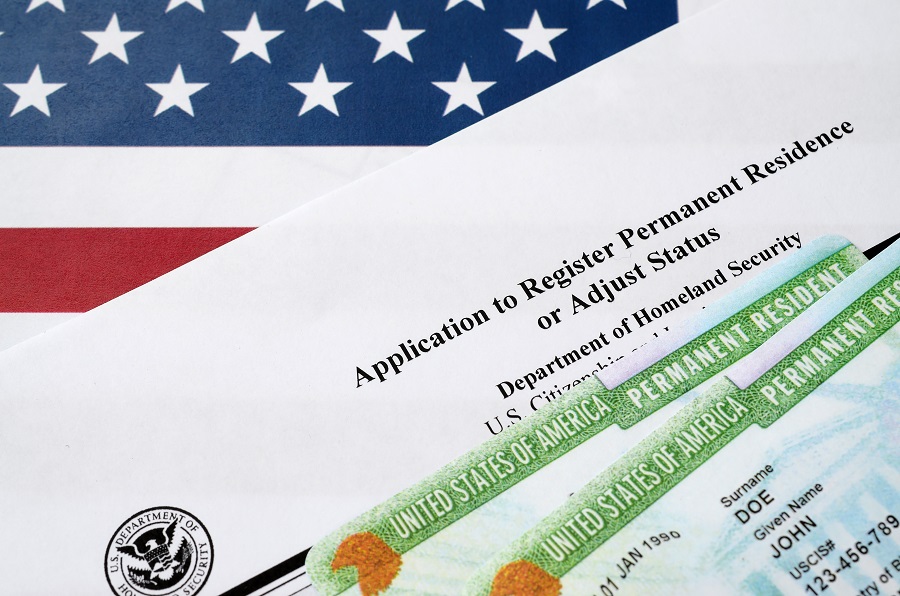Employment Based U.S. Permanent Residency

Employment-based permanent residency is one of the most common avenues that immigrants use to acquire a Green Card. The United States Citizenship and Immigration Services has guidelines for the different permanent residency categories and how to apply for each one.
An employment-based permanent resident card or Green Card is a foreign citizen’s ticket to being able to live and work in the U.S. on a permanent basis. In most cases, this privilege includes the immigrant’s spouse and children. For many, it is also a necessary stepping stone towards gaining citizenship. Contact an immigration lawyer for more information.
There are three employment-based Green Card preference categories that are based on people’s professional qualifications:
-
First Preference (EB-1)
The individuals that fall under this category are commonly referred to as priority workers. These are foreigners that demonstrate extraordinary abilities in the sciences, arts, education, business, or athletics. It also includes professors and researchers that exhibit outstanding performance in their respective fields. The category also covers corporate executives and managers of certain multinational companies.
People that fall under this category have not reached just any type of achievement. They need to demonstrate that they have sustained national or international acclaim in recognition of their expertise.
To do this, they must present either a) evidence of a one-time, major internationally-acknowledged award like a Nobel Peace prize, or b) any three of the following criteria:
- Proof of having received a lesser award but on a national or international level.
- Proof of membership in an association in their field of expertise that requires their members to have outstanding achievements.
- Evidence that a major publication or media outlet has published material about the applicant.
- Proof that they have been assigned or requested to judge others’ work.
- Documentation of their contributions to their fields and that these contributions are original ideas.
- Copies of scholarly articles that they may have written and published in major trade publications.
- Proof that their work has been featured in art exhibits.
- Evidence that they occupied leadership roles in distinguished organizations.
- Present documents that corroborate that they require a higher salary compared to others that are working in the same field.
- Proof of their success in performing arts.
- Professors or Researchers under this category need to prove scholastic excellence by providing any two of the following criteria:
- Proof that they received major awards for their outstanding achievements.
- Proof that they are members of associations that require outstanding achievements from their members.
- Documentation that their work has been written about and featured in professional publications.
- Proof that they participated either alone or in a panel to judge work done by others in the same academic field.
- Proof of contribution or scientific or academic studies in their field.
- Documentation that they wrote books or articles that were published in international journals in their field of expertise.
Green Card Application Process For EB-1 Visa Holders

Individuals claiming extraordinary ability can directly fill out Form I-140, the Petition for Alien Worker, and apply for themselves. Those that claim to be Outstanding Professors and Researchers, as well as Multinational Executives and Managers, need to have a U.S. employer file the form for them. Along with the petition, the American employer has to provide proof that they have the ability to continuously pay the wages of the foreign worker. They may use any financial document like income tax returns, or an annual report.
The families of EB-1 Visa holders who apply for residency become eligible to apply for entry to the United States when the alien worker’s petition has been approved. The spouse will need to apply for E-14 immigration status and children under 21 years of age are eligible for E-15 immigrant status.
-
Second Preference (EB-2)
Persons that have second preference Visas are eligible for employment-based permanent resident cards. This category includes foreign citizens that hold advanced degrees, those that demonstrate exceptional ability in a qualified field, and those that are granted the national interest waiver.
Advanced Degree

This means that a person with an advanced degree or its foreign equivalent is applying for a job that requires his particular educational background. This foreign equivalent means having a baccalaureate degree with 5 years of post-graduate experience in the field.
The foreign worker must provide proof of this advanced degree by providing any of the following:
- Documentation showing that they have a U.S. advanced degree. An example of this is the person’s official academic record.
- If they have the foreign equivalent with five years post-baccalaureate experience, they can present their official academic records along with letters from past employers that will attest that they have the required five years of experience in their field.
Exceptional Ability
Individuals with exceptional abilities in the sciences, arts, or business are those whose expertise in their qualified field is more than that of a regular person. To prove their qualifications, they must comply with at least three of the following criteria:
- Official academic records that prove the alien worker has a degree from a higher institution of learning.
- Letters from employers that indicate they have no less than 10 years of experience in their profession.
- Their professional license to practice in the field.
- Proof that they have earned higher pay than others in the same profession in view of their exceptional ability.
- Evidence that they have membership in a professional association.
- Public recognition by the government, their colleagues, or professional associations, of their achievements and contributions in their respective fields.
- Other evidence that is similar to or comparable with the ones mentioned above.
National Interest Waiver
Most employment-based immigration categories require a Labor Certification. In some instances, the foreigner seeking permanent residency requests that the labor certification be waived because they have abilities that may greatly benefit the United States. Grantees of the waiver are eligible for permanent residency under the second preference category. This is because they are usually qualified through the exceptional ability criteria.
-
Third Preference (EB-3)
Individuals that fall under this category are skilled workers, professionals, and other workers that qualify.
Skilled Workers

Individuals are considered skilled workers if they have a minimum of 2 years of education, training, or work experience. They must be able to prove this with accepted documentation. The education and experience must fit the qualifications for the job they are applying for. It is important that there are no qualified U.S. workers that are able to do the work.
Professionals
Persons that have a U.S. bachelor’s degree or it’s foreign equivalent. Unlike previous preference categories, there is no need to demonstrate exceptional academic performance. The important thing is that the degree meets the job requirements and that the job can’t be filled for lack of qualified workers in the U.S.
Unskilled Workers
The term unskilled workers refers to individuals who are able to perform unskilled labor or work that requires less than 2 years of training or experience. This is different from temporary unskilled work since under this category, the work is permanent and not seasonal.
All three sub-categories under the EB-3 category need a labor certification and a permanent and full-time job offer.
-
Fourth Preference (EB-4)
This employment-based permanent residence category includes special immigrants that meet certain qualifications. The list includes the following:
Religious Workers
This refers to ministers or non-ministers that do religious full-time, paid work. The program for non-minister religious vocations that allowed non-ministers to become permanent residents until December 3, 2021 was extended by the U.S. government. Those already in the U.S in this capacity were given until February 18, 2022 instead of December 3, 2021, to apply for permanent residency.
Ministers and their immediate family are not affected by the sunset date.
For a minister to qualify for special immigrant status, they must be a part of a religious denomination that runs an actual non-profit organization in the U.S. for a minimum of 2 years prior to filing. It is also required that they are seeking entry into the country to work as a paid minister at that religious denomination. By paid, it means working at least 35 hours per week with a salaried or non-salaried compensation.
The minister should be coming to the U.S. to work for the bona fide non-profit religious organization in the country. Working for a lawful organization associated with a religious sect in the country is also considered.
Another instance when the person is deemed eligible is when they have worked as non-ministers abroad or in the U.S., for organizations mentioned above, after the age of 14. They should have been working on a continued basis for at least 2 years before applying for a Green Card.
Special Immigrant Juveniles

A minor living in the United States who required the protection of juvenile court due to abuse, abandonment, or neglect of a parent may be eligible for a Green Card.
The following requirements need to be complied with:
- The minor must be below 21 years of age at the time of the filing of the Special Immigrant Juvenile petition.
- They must be living in the U.S. at the time of filing.
- The person must not be married nor previously married.
- They must have a bona fide juvenile court order from a U.S. state court that officially declares the minor as dependent on the court. The order must state that the court found that the minor suffered abuse, abandonment or neglect of a parent and is unable to reunite with one or both parents. The court must also state in the order that returning the minor to their home country is not in their best interest.
There must be evidence that the juvenile court order was warranted by the situation and not simply sought in order to gain immigrant status. There has to be a written consent provided by the Department of Health and Human Services if the minor is currently in their custody or if the court also orders change of custody or placement.
Other Individuals Qualified Under EB-4
- Noncitizen broadcasters that come to the U.S. to work for the United States Agency For Global Media. This sub-category is capped at 100 Visas per year.
- Some retired officers or current employees of a G-4 international organization as recognized by the United States, or NATO-6 civilian employees and their families.
- Some employees of the American government abroad, along with the former’s family.
- U.S. armed forces members.
- Employees of the Panama Canal company or Canal Zone government workers.
- Qualified physicians who have been working in the U.S. as doctors since January 9, 1978.
- Afghanistan or Iraq nationals who served the U.S. government as interpreters abroad.
- Iraq nationals that worked for the American government.
- Afghanis that worked either for the U.S. government or the International Security Assistance Force.

Fifth Preference (EB-5)
The EB-5 category covers the Immigrant Investor Program. Through this program, investors and their spouses and unmarried children are eligible for permanent residence. These investors must comply with the following requisites:
- Must invest in a business in the U.S.
- Such businesses must be able to provide at least 10 full time and long-term jobs for U.S. workers qualified for the job.
- Petitions filed on or after November 21, 2019 must be based on an investment minimum of $1,800,000 in a high-employment area. The minimum requirement for investing in a targeted or low employment area is $900,000.
There is no labor certification requirement for immigrant investor petitions.
Read about how to avoid Deportation.


